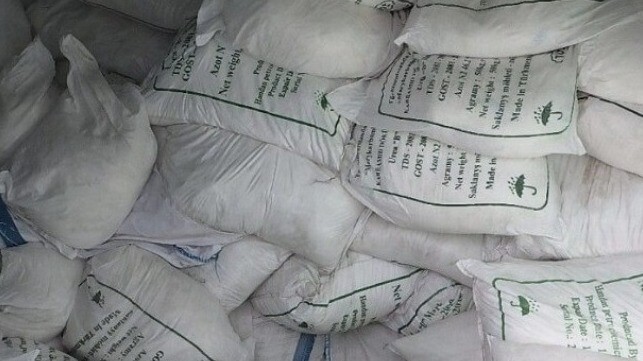Ship Laden With Ballistic Missile Propellant Nears Iran

One of two Iranian cargo vessels believed to be carrying sodium perchlorate, the primary ingredient of ammonium perchlorate which is used by Iranian solid-fuelled ballistic missiles, has passed the southern tip of India and is now four days out from Bandar Abbas. It is due to arrive on February 14.
The 28,000-tonne MV Golbon was reported by the Financial Times to be laden with 34 20-foot containers packed with sodium perchlorate in pellet form. Its sister ship MV Jairan is still currently holding its position in the Xiushan Island anchorage 100 miles East of Shanghai, and may not have yet taken on its expected consignment of 24 containers. Usefully, both ships are sailing with their AIS automatic identification systems switched on, and Jairan's declared draft suggests she is in ballast. Both ships are registered to Islamic Republic of Iran Shipping Lines (IRISL), and are subject to secondary US Treasury sanctions.
UN Security Resolution 1929 adopted in 2010 specifically cautions States to be aware of IRISL’s sanctions-breaking activities in its curbs on the export to Iran of, amongst other equipment, ‘missiles or missile systems … including the provision of technical or financial assistance for such systems, or spare parts’.
Sodium perchlorate is processed at the Iranian facility at Parchin south of Tehran into ammonium perchlorate, which makes up 70% of the standard fuel load of most of Iran’s solid-fueled ballistic missiles.
Iranian ballistic missiles which use ammonium perchlorate include medium range Khybar-Shikan and Fattah missiles, and the shorter range Fateh-110 and Zolfaghar missiles. In original and variant form, these have been widely exported to Russia and Axis of Resistance allies, and have been used to attack shipping at sea and targets in Saudi Arabia, the UAE, Israel and Ukraine, as well as in the attacks causing injuries to American service personnel at Al Asad in Iraq.

that matters most
Get the latest maritime news delivered to your inbox daily.
Iran is likely to be short of ammonium perchlorate at present. Its own ballistic missile domestic fuel production facilities have been damaged in Israeli attacks, and output demands are high because of the need to replace stocks expended in attacks on Israel and to meet increased exports to Russia.
For those hoping to spot these Iranian ships, the vessels are no longer painted with large IRISL lettering amidships.
